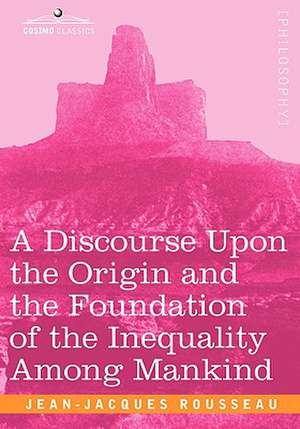A Discourse Upon the Origin and the Foundation of the Inequality Among Mankind
Autor Jean Jacques Rousseauen Limba Engleză Paperback – 30 noi 2008
| Toate formatele și edițiile | Preț | Express |
|---|---|---|
| Paperback (9) | 39.41 lei 22-36 zile | |
| – | 39.41 lei 22-36 zile | |
| CREATESPACE – | 58.62 lei 22-36 zile | |
| Echo Library – 17 iun 2007 | 65.18 lei 38-44 zile | |
| Blurb – 21 aug 2022 | 75.48 lei 43-57 zile | |
| Binker North – iun 1755 | 75.87 lei 43-57 zile | |
| Bottom of the Hill Publishing – 29 feb 2012 | 76.15 lei 38-44 zile | |
| Bottom of the Hill Publishing – 31 mai 2011 | 78.16 lei 43-57 zile | |
| COSIMO CLASSICS – 30 noi 2008 | 82.07 lei 43-57 zile | |
| NuVision Publications – 14 aug 2005 | 97.79 lei 38-44 zile | |
| Hardback (1) | 158.19 lei 38-44 zile | |
| Binker North – 10 sep 2019 | 158.19 lei 38-44 zile |
Preț: 82.07 lei
Nou
Puncte Express: 123
Preț estimativ în valută:
15.70€ • 16.44$ • 12.99£
15.70€ • 16.44$ • 12.99£
Carte tipărită la comandă
Livrare economică 07-21 aprilie
Preluare comenzi: 021 569.72.76
Specificații
ISBN-13: 9781605203690
ISBN-10: 1605203696
Pagini: 64
Dimensiuni: 178 x 254 x 3 mm
Greutate: 0.13 kg
Editura: COSIMO CLASSICS
ISBN-10: 1605203696
Pagini: 64
Dimensiuni: 178 x 254 x 3 mm
Greutate: 0.13 kg
Editura: COSIMO CLASSICS
Notă biografică
Jean-Jacques Rousseau (28 June 1712 - 2 July 1778) was a Genevan philosopher, writer and composer. His political philosophy influenced the progress of the Enlightenment throughout Europe, as well as aspects of the French Revolution and the development of modern political, economic and educational thought. His Discourse on Inequality and The Social Contract are cornerstones in modern political and social thought. Rousseau's sentimental novel Julie, or the New Heloise (1761) was important to the development of preromanticism and romanticism in fiction.[2][3] His Emile, or On Education (1762) is an educational treatise on the place of the individual in society. Rousseau's autobiographical writings-the posthumously published Confessions (composed in 1769), which initiated the modern autobiography, and the unfinished Reveries of a Solitary Walker (composed 1776-1778)-exemplified the late-18th-century "Age of Sensibility", and featured an increased focus on subjectivity and introspection that later characterized modern writing. Rousseau befriended fellow philosophy writer Denis Diderot in 1742, and would later write about Diderot's romantic troubles in his Confessions. During the period of the French Revolution, Rousseau was the most popular of the philosophers among members of the Jacobin Club. He was interred as a national hero in the Panthéon in Paris, in 1794, 16 years after his death. Rousseau was born in Geneva, which was at the time a city-state and a Protestant associate of the Swiss Confederacy. Since 1536, Geneva had been a Huguenot republic and the seat of Calvinism. Five generations before Rousseau, his ancestor Didier, a bookseller who may have published Protestant tracts, had escaped persecution from French Catholics by fleeing to Geneva in 1549, where he became a wine merchant
